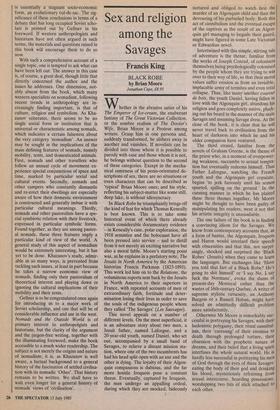Sex and religion among the Savages
Francis King
BLACK ROBE by Brian Moore
Jonathan Cape, .£8.95
Whether in the abrasive satire of his The Emperor of Ice-cream, the exuberant fantasy of The Great Victorian Collection, or the sombre realism of The Doctor's Wife, Brian Moore is a Proteus among writers. Grasp him in one persona and, suddenly transformed, he slithers away in another and vanishes. If novelists can be divided into those whom it is possible to parody with ease and those whom it is not, he belongs without question to the second of these categories. Except in the mecha- nical sameness of his penis-orientated de- scriptions of sex, there are no situations or even characters that can be described as 'typical' Brian Moore ones; and his style, reflecting his subject-matter like some still, deep lake, is without idiosyncracy.
In Black Robe he triumphantly brings off the kind of feat for which Thomas Keneally is best known. This is to take some historical event of which there already exists considerable documentary evidence — in Keneally's case, polar exploration, the 1918 armistice and the holocaust have all been pressed into service — and to distill from it not merely an exciting narrative but also a moral fable. Moore's starting point was, as he explains in a prefatory note, The Jesuits in North America by the American historian Francis Parkman (1823-1893). This work led him on to the Relations, the voluminous reports sent back by the Jesuits in North America to their superiors in France, with repeated accounts of men of extraordinary faith, fortitude and deter- mination losing their lives in order to save the souls of the indigenous people whom they called 'The Savages' (Les Sauvages).
This novel appeals on a number of different levels. On the most superficial, it is an adventure story about two men, a Jesuit father, named Laforgue, and a 20-year-old youth, named Daniel, who set out, accompanied by a small band of Savages, to relieve a distant mission sta- tion, where one of the two incumbents has had his head split open with an axe and the other is dying. The loyalty of their Algon- quin companions is dubious, and the far more hostile Iroquois pose a constant threat. Eventually, captured by Iroquois, the men undergo an appalling ordeal, during which they are mocked, hideously tortured and obliged to watch first the murder of an Algonquin child and then the devouring of his parboiled body. Both this act of cannibalism and the eventual escape of the captives as the result of an Algon- quin girl managing to beguile their guard, might have figured in some Late Victorian or Edwardian novel.
Intertwined with this simple, stirring tale of adventure is the theme, familiar from the works of Joseph Conrad, of colonisers themselves being psychologically colonised by the people whom they are trying to win over to their way of life, so that their moral values suffer erosion as from an invisible, implacable army of termites and even total collapse. Thus, like many another coureur de bois, the youth Daniel, having fallen in love with the Algonquin girl, abandons his religion and goes completely native, pluck- ing out his beard in the manner of the male Savages and assuming Savage dress. At the close of the book, it is clear that he will never travel back to civilisation from the heart of darkness into which he and his older companion have ventured.
The third strand, familiar from the novels of Graham Greene, is the theme of the priest who, in a moment of overpower- ing weakness, succumbs to sexual tempta- tion but eventually redeems himself. Thus Father Laforgue, watching the French youth and the Algonquin girl copulate, begins 'to jerk furiously until his semen spurted, spilling on the ground.' In the cunning manner in which he has plaited these three themes together, Mr Moore might be thought to have been guilty of manipulating his readers, were it not that his artistic integrity is unassailable.
The one failure of the book is in finding a convincing idiom for the Savages. We know from contemporary accounts that, as a form of banter, the Algonquin, Iroquois and Huron would interlard their speech with obscenities and that this, not surpri- singly, shocked and surprised the 'Black Robes' (Jesuits) when they came to learn the languages. But exchanges like 'Have you told that fart of a Black Robe? He's going to shit himself' or 'I say No. L say fuck the Normans', evoke the slums of present-day Montreal rather than the wastes of 16th-century Quebec. A writer of supreme stylistic virtuosity, an Anthony Burgess or a Russell Hoban, might have solved an admittedly difficult problem more satisfactorily.
Otherwise Mr Moore is remarkably suc- cessful in portraying his Savages, with their hedonistic polygamy, their ritual cannibal- ism, their 'caressing' of their enemies to death through prolonged torture, their obsession with the prophetic nature of dreams, and their belief that a living spirit interfuses the whole natural world. He is hardly less successful in portraying his men of God through the eyes of these Savages: eating the body of their god and drinking his blood, mysteriously refraining from sexual intercourse, hoarding possessions, worshipping two bits of stick attached to each other.










































 Previous page
Previous page